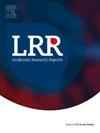Two cases of AMeD syndrome with isochromosome 1q treated with allogeneic stem cell transplantation
IF 0.7
Q4 HEMATOLOGY
引用次数: 0
Abstract
AMeD syndrome is characterized by aplastic anemia, mental retardation, short stature, and microcephaly and is caused by digenic mutations in the aldehyde dehydrogenase 2 (ALDH2) and alcohol dehydrogenase 5 (ADH5) genes. We have successfully performed hematopoietic stem cell transplantation in two patients with AMeD syndrome and isochromosome 1q. AMeD syndrome with myelodysplastic syndrome or acute myeloblastic leukemia generally has a poor prognosis; however, early diagnosis may improve treatment response. Although the gain of 1q has been considered as a form of early clonal evolution in Fanconi anemia, it may be an equally important finding observed in AMeD syndrome.
同种异体干细胞移植治疗两例 1q 同染色体 AMeD 综合征病例
AMeD综合征以再生障碍性贫血、智力低下、身材矮小和小头畸形为特征,由醛脱氢酶2(ALDH2)和醇脱氢酶5(ADH5)基因的二基因突变引起。我们已成功地为两名患有 AMeD 综合征和 1q 异染色体的患者进行了造血干细胞移植。AMeD综合征合并骨髓增生异常综合征或急性粒细胞白血病的预后一般较差;然而,早期诊断可改善治疗反应。虽然在范可尼贫血症中,1q增益被认为是早期克隆进化的一种形式,但在AMeD综合征中,它可能是一个同样重要的发现。
本文章由计算机程序翻译,如有差异,请以英文原文为准。
求助全文
约1分钟内获得全文
求助全文

 求助内容:
求助内容: 应助结果提醒方式:
应助结果提醒方式:


